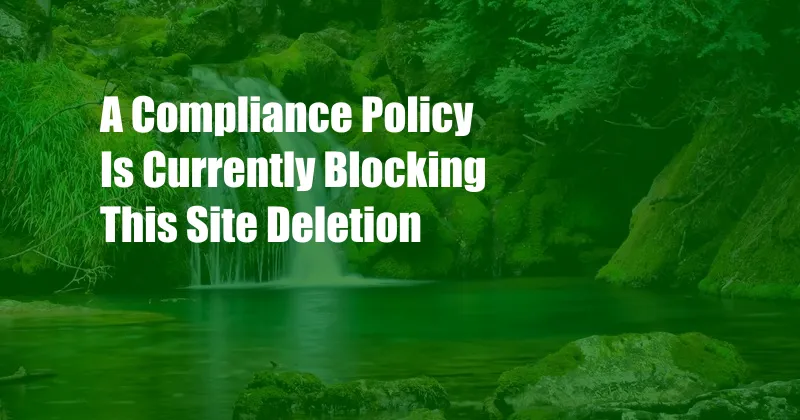
A Compliance Policy Is Currently Blocking This Site Deletion: Navigating the Complexities of Data Retention
Have you ever encountered the frustrating message, “A compliance policy is currently blocking this site deletion”? It’s a common dilemma that many website owners face when they attempt to delete their sites. But why does it happen, and what can you do to resolve it? Understanding the intricacies of compliance policies is crucial for ensuring seamless website deletion and compliance with regulations.
Compliance policies are rules and regulations established by organizations to ensure that they meet legal and ethical obligations, such as data protection laws and industry standards. These policies often govern how data is collected, used, stored, and deleted. When a compliance policy is in place, it may prevent the deletion of certain data or sites to maintain compliance with those regulations.
The Role of Data Retention Policies
Data retention policies are a critical aspect of compliance policies. They define the specific periods for which data must be stored to meet legal, regulatory, or business requirements. Compliance with these policies is essential for organizations to mitigate risks and avoid legal liabilities.
For example, the healthcare industry must adhere to the Health Insurance Portability and Accountability Act (HIPAA), which requires the retention of medical records for a specific period. Financial institutions, on the other hand, may be required to retain financial records for tax or audit purposes.
Navigating Compliance Policies for Site Deletion
To address the issue of “A compliance policy is currently blocking this site deletion,” website owners must carefully review the relevant compliance policies and data retention schedules. Identify which policies apply to the site and the data it contains.
Contact the appropriate compliance officer or legal counsel within the organization to understand the specific requirements. They can provide guidance on the necessary steps to take, such as obtaining legal authorization or amending the compliance policy to allow for deletion.
In some cases, it may be necessary to demonstrate that the data is no longer relevant, obsolete, or no longer required for operational or legal purposes. Providing evidence to support this claim can help expedite the deletion process.
Tips and Expert Advice for Website Owners
To avoid encountering site deletion issues, website owners should consider the following tips:
– **Review compliance policies regularly:** Stay updated on changes to compliance policies that may affect site deletion practices.
– **Create and maintain a data retention schedule:** Implement a comprehensive policy that outlines the retention periods for different types of data.
Frequently Asked Questions
Q: What if I need to delete data immediately due to a security breach?
Contact the compliance officer or legal counsel immediately. They can assess the situation and determine the appropriate course of action.
Q: Can I appeal a compliance policy that is blocking site deletion?
Yes, you can appeal a compliance policy if you believe it is unreasonable or outdated. Present a strong case to the relevant authority, explaining why the policy should be amended or removed.
Conclusion
Understanding compliance policies is essential for ensuring seamless website deletion and maintaining compliance with regulations. By carefully reviewing policies, consulting appropriate authorities, and implementing effective data retention practices, website owners can navigate the complexities of “A compliance policy is currently blocking this site deletion” and ensure timely and compliant data management.
Are you curious about the topic of compliance policies and data retention? Share your thoughts and questions in the comments below.